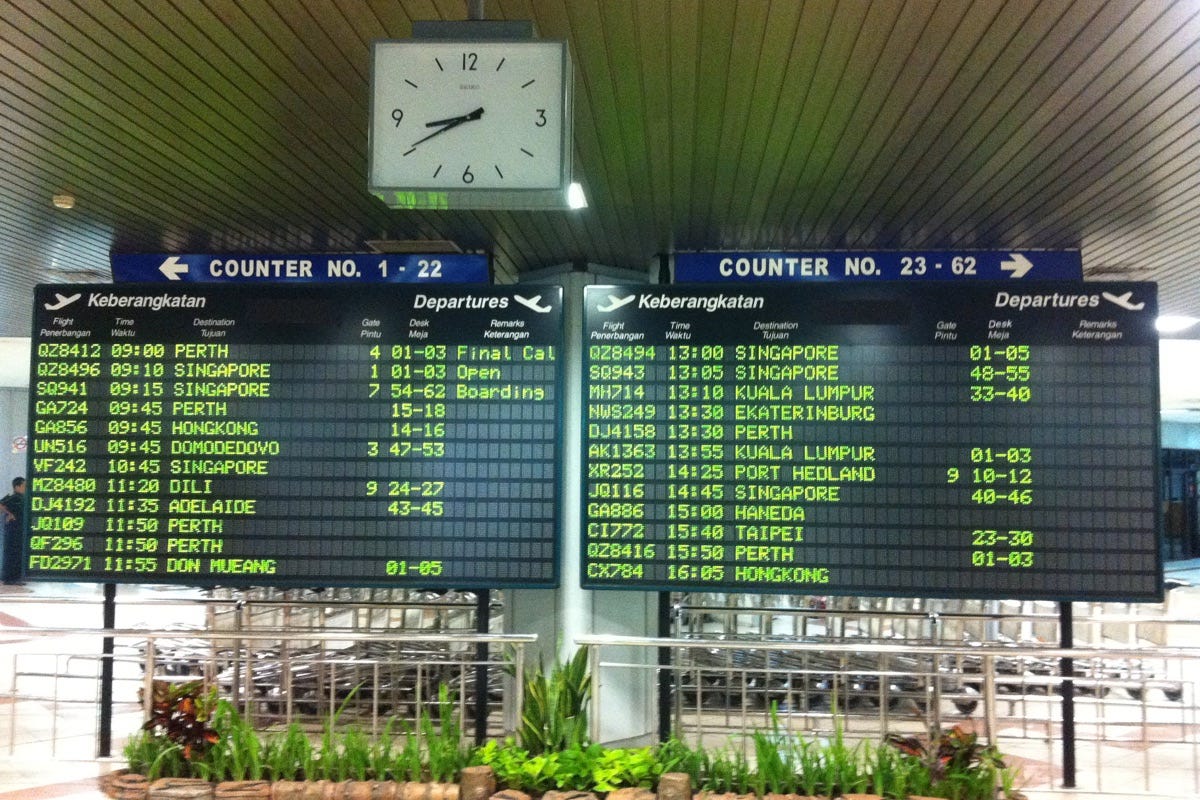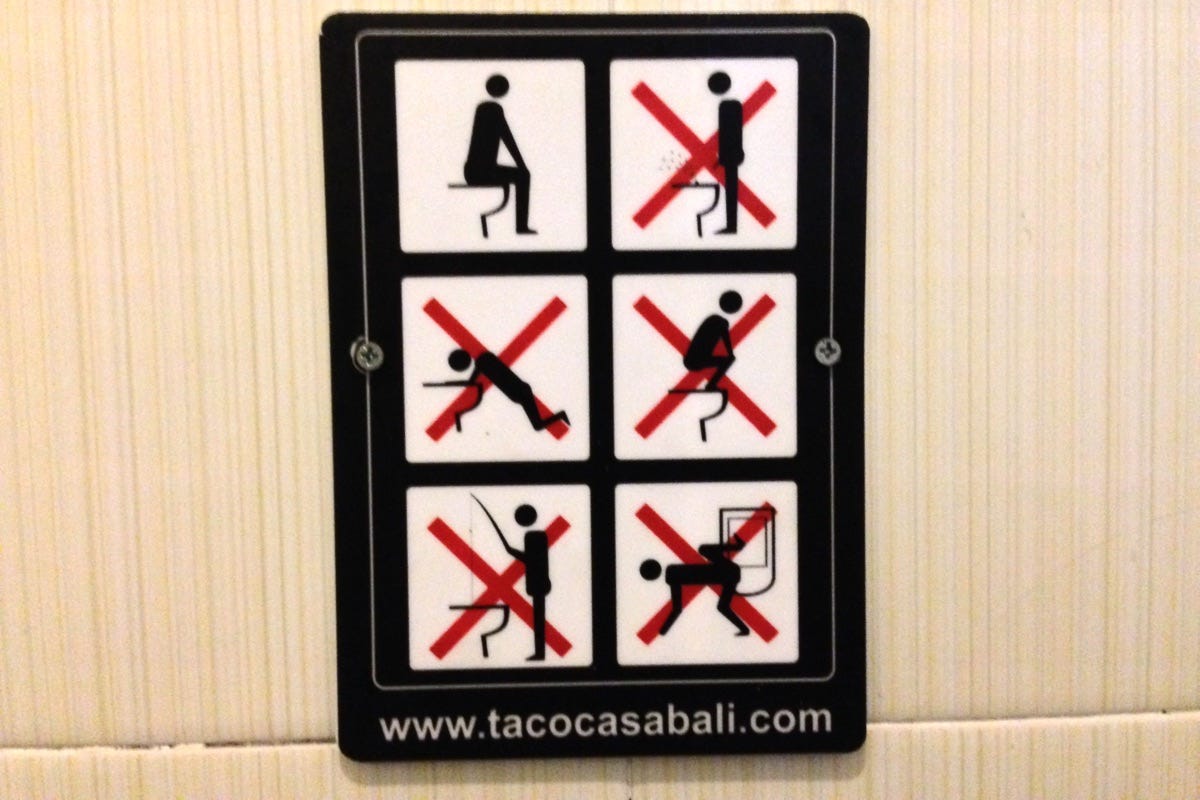This is the third part in a series I’m writing about tourism in Southeast Asia. Part one looked at World Tourism Day and part two at sustainable tourism.
So with sustainable tourism behind us, what about its bedfellow, responsible tourism? To be honest, on the clarity stakes, matters don’t improve much, but it does give us some better bones to build upon. The term is often used in a synonymous fashion alongside sustainable tourism, but they are different beasts.
The term came into popular use in Cape Town, South Africa, when, in 2002 it formed the centrepiece of the Cape Town Declaration. Tourism academic Harold Goodwin is commonly seen as the mover and shaker behind the concept, but many of its points were already in widespread use. What the declaration did, was to wrap up a glad bag of practices into a cohesive bundle and present it to the travel industry.
I’m not suggesting you should take the bus to Domodedovo. Photo: Stuart McDonald.
The industry, seeing a lucrative new niche, coopted many of its principles into a “new” form of travel. They took it, particularly in the UK, packaged it up, and sold it—at a premium. A cynic might even say responsible tourism exists not because it is the right thing to do, but because it is a nice earner.
At its core, the declaration sees responsible tourism as having seven anchors. To its mind, responsible tourism:
Minimises negative economic, environmental, and social impacts;
Generates greater economic benefits for local people and enhances the well-being of host communities, improves working conditions and access to the industry;
Involves local people in decisions that affect their lives and life chances;
Makes positive contributions to the conservation of natural and cultural heritage, to the maintenance of the world’s diversity;
Provides more enjoyable experiences for tourists through more meaningful connections with local people, and a greater understanding of local cultural, social and environmental issues;
Provides access for physically challenged people;
Is culturally sensitive, engenders respect between tourists and hosts, and builds local pride and confidence.
The declaration recognises the damage tourism is capable of and, through these steps, it advises on how to reduce the bad. The policies are sound, but, as is the case with sustainable tourism, in reflecting the differences inherent to a variety of destinations (and travellers) the principles are advisory rather than instructive.
Train stations are not hard to find. Photo: Stuart McDonald.
I’m not going to go through them one by one, but to illustrate my point, take the top item: “Minimises negative economic, environmental, and social impacts.” What does this actually mean? How does a traveller act on this? Is minimising your economic impact staying at an enormous resort (which provides lots of jobs) or staying at a family-owned homestay (which employs a local family). Is not standing on coral minimising your environmental damage? Wouldn’t not doing a snorkelling trip at all be a more responsible approach?
You could answer in the affirmative to all four of my questions and satisfy the lead point. Each, in their own way, satisfies the demands of responsible tourism. It can indeed be everything to everyone. So while responsible tourism has clearer guidelines, they remain open to broad interpretation. There’s no imperative to adopt them all, nor to any prescribed degree, instead we’re left with “minimise,” “contribute,” and “involve.” Before you know it, we’re back enjoying a piña colada with a bamboo straw by our private horizon pool. This is not ideal.
In Baja California yes, in Bali no. Photo: No idea, just found it on my laptop.
As with sustainable tourism, behind the headlines, there is a commercial imperative at work. Responsible tourism is an agent of minimisation not negation. While it may be true that if you want to be an environmentally responsible traveller, you should start by not getting on an airplane, that’s simply not going to fly (sorry!). It is hard to sell Thailand tours in the UK if one of your responsible precepts is to not get on an airplane.
Instead travellers have a set of principles which they then need to figure out how to adopt. How can one apply the core tenants of responsible tourism but still travel? Some might choose to take the long-haul flight, but not fly domestic in-country. This is better than nothing, and easy to do, and yet there’s no imperative in the declaration to do so.
I’m not always responsible myself (I eat tacos in Bali, not that I don’t know how to use a toilet), but pre-trip research is always a good idea. Photo: Stuart McDonald.
Responsible tourism relies to an extent on a benevolent lie—or myth—and one that is necessary for it to survive. I wonder though, seeing some of the activities packaged as responsible, just how benevolent the lie really is. In buying into the arguments that underwrite responsible travel, you’re buying into its ideology. In essence it is a salve for the often destructive consumerism that embodies modern tourism.
So how does an independent traveller best instil this ideology? None of the steps suggested by the declaration are bad. Firm targets, tailored to one’s own travelling style, would be a good start. I like to think about trying to travel in a responsible manner like packing before a trip. I’ve long said that when packing you should place all your kit on your bed and then put half of it back in the cupboard. With travelling responsibly, it is the opposite. Make a list of everything you can do, make firm, clear, actionable targets, then double the length of your list—or your targets.
Drink local—your waistline will not thank you. Photo: Stuart McDonald.
What do I mean by actionable targets? Taking again the headline item, what can you, the individual do, to best embody this?
As already mentioned, you could avoid going anywhere near a domestic flight. Avoid the offshoring of your money by using only locally owned operations. Visit a national park only if sufficient safeguards are in place. Eat only locally-produced food—do not eat seafood. Learn about the destination you are planning to visit before you arrive—yes, read books and buy a guidebook.
Take my word for it, much of the information needed to inform these decisions—by design—is not easy to come by. Look at the website of any major tourism business and try to figure out who owns it, what they pay their staff, or better still, where (or if!) they pay tax. Good luck with that.
Responsible tourism needs many helping hands to get things right. Photo: Stuart McDonald.
As with sustainable tourism, destinations need an honest application of the practice. This should be an all-encompassing one. Examine every part of your typical travel routine and ask yourself “how can I do better?”
To say the least, for most, this will be a challenge. A bit of hard work though never hurt anyone. Aside from having less impact, you may learn a thing or two in the process. I do suggest skipping the lessons offered by Battambang’s local wineries though.
Other episodes in the Rethinking Tourism series:
National Chocolate Milk Day (World Tourism Day)
Nice Tourism (Sustainable Tourism)
The Benevolent Lie (Responsible Tourism)
The Year Is 2006. The Town Is Luang Prabang (Pro-poor Tourism)
Zoom in to the Red Plastic Chairs (Slow Travel)
The Petro-bourgeoisie (Flying, carbon etcetera)
Reality Check (Tour companies)
Follow the Money (Money matters)
Foundations Matter (Community Based Tourism)
Couchfish is 100 per cent independent and reader-supported. If you’re not already a subscriber, and you’d like to show your support, become a paying subscriber today for just US$7 per month—you can find out more about Couchfish here—or simply share this story with a friend.
Don’t forget, you can find the free podcasts on Apple, Pocket Casts and Spotify as well as right here on Couchfish.
















